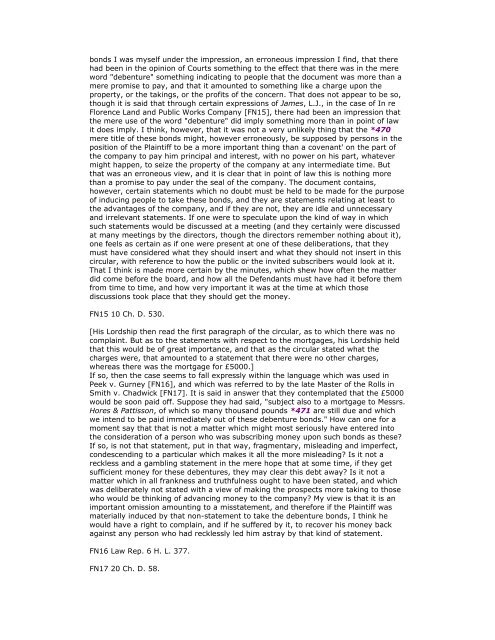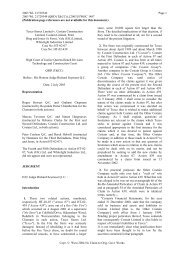Edington v Fitzmaurice - Thomson Reuters
Edington v Fitzmaurice - Thomson Reuters
Edington v Fitzmaurice - Thomson Reuters
You also want an ePaper? Increase the reach of your titles
YUMPU automatically turns print PDFs into web optimized ePapers that Google loves.
onds I was myself under the impression, an erroneous impression I find, that therehad been in the opinion of Courts something to the effect that there was in the mereword "debenture" something indicating to people that the document was more than amere promise to pay, and that it amounted to something like a charge upon theproperty, or the takings, or the profits of the concern. That does not appear to be so,though it is said that through certain expressions of James, L.J., in the case of In reFlorence Land and Public Works Company [FN15], there had been an impression thatthe mere use of the word "debenture" did imply something more than in point of lawit does imply. I think, however, that it was not a very unlikely thing that the *470mere title of these bonds might, however erroneously, be supposed by persons in theposition of the Plaintiff to be a more important thing than a covenant' on the part ofthe company to pay him principal and interest, with no power on his part, whatevermight happen, to seize the property of the company at any intermediate time. Butthat was an erroneous view, and it is clear that in point of law this is nothing morethan a promise to pay under the seal of the company. The document contains,however, certain statements which no doubt must be held to be made for the purposeof inducing people to take these bonds, and they are statements relating at least tothe advantages of the company, and if they are not, they are idle and unnecessaryand irrelevant statements. If one were to speculate upon the kind of way in whichsuch statements would be discussed at a meeting (and they certainly were discussedat many meetings by the directors, though the directors remember nothing about it),one feels as certain as if one were present at one of these deliberations, that theymust have considered what they should insert and what they should not insert in thiscircular, with reference to how the public or the invited subscribers would look at it.That I think is made more certain by the minutes, which shew how often the matterdid come before the board, and how all the Defendants must have had it before themfrom time to time, and how very important it was at the time at which thosediscussions took place that they should get the money.FN15 10 Ch. D. 530.[His Lordship then read the first paragraph of the circular, as to which there was nocomplaint. But as to the statements with respect to the mortgages, his Lordship heldthat this would be of great importance, and that as the circular stated what thecharges were, that amounted to a statement that there were no other charges,whereas there was the mortgage for £5000.]If so, then the case seems to fall expressly within the language which was used inPeek v. Gurney [FN16], and which was referred to by the late Master of the Rolls inSmith v. Chadwick [FN17]. It is said in answer that they contemplated that the £5000would be soon paid off. Suppose they had said, "subject also to a mortgage to Messrs.Hores & Pattisson, of which so many thousand pounds *471 are still due and whichwe intend to be paid immediately out of these debenture bonds." How can one for amoment say that that is not a matter which might most seriously have entered intothe consideration of a person who was subscribing money upon such bonds as these?If so, is not that statement, put in that way, fragmentary, misleading and imperfect,condescending to a particular which makes it all the more misleading? Is it not areckless and a gambling statement in the mere hope that at some time, if they getsufficient money for these debentures, they may clear this debt away? Is it not amatter which in all frankness and truthfulness ought to have been stated, and whichwas deliberately not stated with a view of making the prospects more taking to thosewho would be thinking of advancing money to the company? My view is that it is animportant omission amounting to a misstatement, and therefore if the Plaintiff wasmaterially induced by that non-statement to take the debenture bonds, I think hewould have a right to complain, and if he suffered by it, to recover his money backagainst any person who had recklessly led him astray by that kind of statement.FN16 Law Rep. 6 H. L. 377.FN17 20 Ch. D. 58.
















